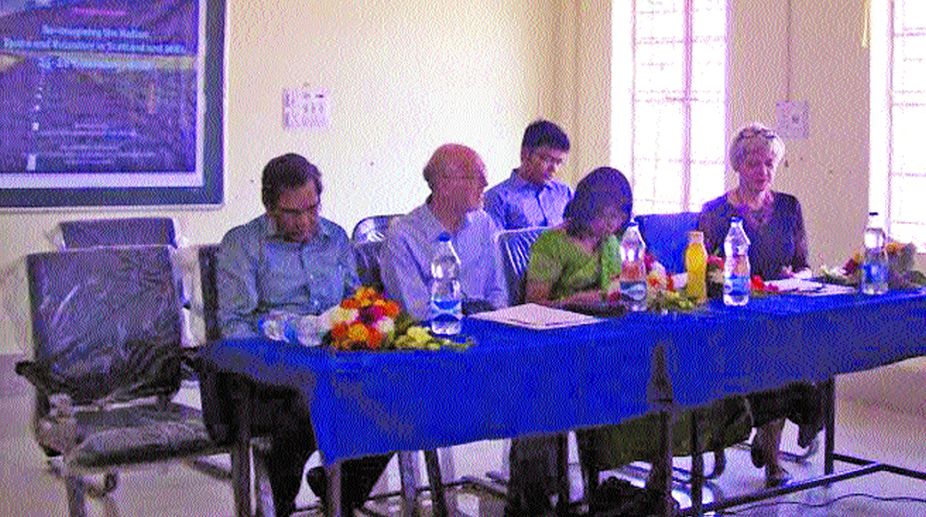History exhibition chronicling city’s past
The four-day 18th International History and Heritage exhibition will be inaugurated on 11 February at Sabarna Sangrahasala in Barisha.

(PHOTO: SNS)
The study of Scottish literature, with its multi-lingual history in Gaelic and English, and its place in the cultural and political history of modern Scotland, is an astonishingly rich resource for understanding cultural diversity, the underpinnings of political power, and the long trajectory of its historical tradition especially inflected by its relationship with India in the colonial and post-colonial era.
Scottish literary and political culture has always been suffering from an anxiety of subservience — they show distinctive contextual specificities embedded in the cultural and political formations and Scotland has remained peripheral in the context of English history. Here it would be relevant to look back on the Scottish tradition built up by the universities of Edinburgh and Glasgow in the mid-18th century, which asserted their cultural identity beyond provincial preoccupations.
It has been lamented by critics that Scottish literature and culture, despite its enviable flowering in the 15th century, gradually disappeared till its reappearance in the 18th century. In the post-Chaucerian era, the country seemed to develop a distinctive cultural identity, as evident from the writings of James Stewart, David Lyndsay, Robert Henryson or William Dunbar. In the 18th century, Scottish tradition, however, came to be more significantly substantiated through writers such as David Hume, Adam Smith, Mark Akenside, Robert Blair and James Macpherson. While David Hume and Adam Smith concentrated on historical and philosophical writings, Macpherson and Akenside led to the development of the age of sensibility. In the 19th century, Sir Walter Scott not only brought about a new consciousness of historical romance, he also developed a distinctive sense of Scottish nationalism.
The Indian Association of Scottish Studies in collaboration with Bankura University organised a conference on “Re-imagining the Nation: Space and Boundary in Scotland and India” recently. It was attended by eminent scholars from Scotland and across Indian universities. Gautam Buddha Sural, head, department of English delivered the welcome address. Carla Sassi of The University of Verona, in her keynote address, distinctively welcomed this collaborative endeavour and gave a scholarly mapping of the relevance of Scottish Studies in India. She also spoke on “Conflicting Landscapes in Scottish Literature”. Thereafter Bashabi Fraser of Edinburgh Napier University, in her plenary speech, spoke on “Scottish Orientalists and the Bengal Renaissance” while Neil Fraser of the University of Edinburgh spoke on “Educator, Innovator, Environmentalist: Patick Geddes and Rabindranath Tagore”. The discussions developed an idea of Scottish Studies in the audience.
On the other hand, Indian scholars largely examined the Scottish-Indian cultural connections in British India. The wide spectrum of inter-disciplinary subjects covered by the eminent Indian scholars ranged from memoirs and sketches of India by Scottish writers; the conservation work and engraved history at the Scottish Cemetery in Kolkata; the spread of education among the Lepchas to the Scottish poets of John Company, Scottish Orientalism, Scottish animal stories, Scottish missionaries in India, comparative legal studies of India and Scotland et al.
In the inaugural session, Deb Narayan Bandyopadhyay, vice chancellor of Bankura University, recollected how the entire episode of development of Indian Association of Scottish Studies started over a cup of coffee and how it has spread within a span of about two years. He also pointed out that he had already recommended the inclusion of Scottish Studies as an optional course for the students of English and the department has already developed a curriculum on the same for fourth semester students.
The vice chancellor has also initiated an exchange programme between Bankura University and Universities in Scotland. The Government of Scotland has donated around 8,000 books on Scottish literature, law, social sciences and such other allied subjects to Bankura University. A separate James Alison Section has been established in the library of the university and books and other articles of Alison have been kept there on exhibition. One hopes that Bankura University will become a hub of Scottish literary studies in the near future.
THE WRITER IS ASSISTANT PROFESSOR AND HEAD, DEPARTMENT OF ENGLISH, DR GOUR MOHAN ROY COLLEGE, UNIVERSITY OF BURDWAN
Advertisement
Advertisement